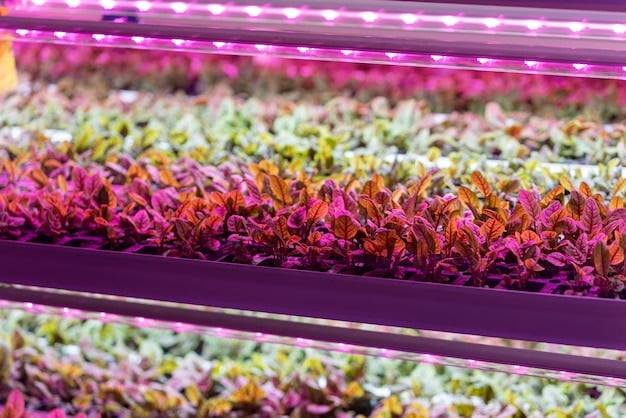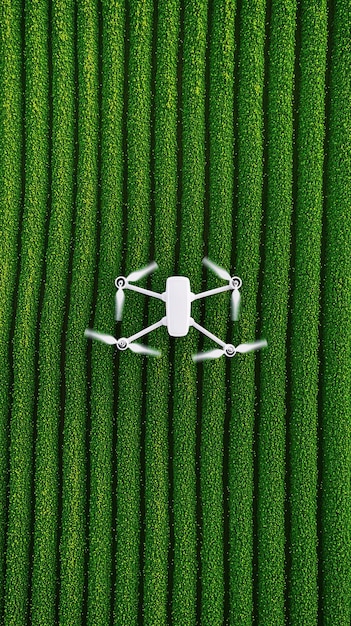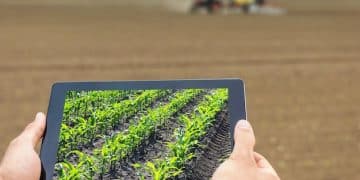US Food Startups: Pioneering Plant-Based & Sustainable Agriculture

In the United States, a dynamic surge of startups is actively redefining the food industry by spearheading advancements in plant-based alternatives and sustainable agricultural practices, addressing critical environmental and health challenges.
In a rapidly evolving world, the way we produce and consume food is undergoing a profound transformation. This Startup Spotlight: The Future of Food – US Startups Pioneering Plant-Based Alternatives and Sustainable Agriculture delves into the innovative landscape of the United States, highlighting companies at the forefront of this culinary revolution.
The Imperative for Food System Transformation
The global food system faces unprecedented challenges. From climate change and resource depletion to growing populations and health concerns, the urgency to find more sustainable and efficient ways to feed the world is clear.
Traditional agricultural methods, while foundational, often come with a significant environmental footprint. This includes extensive land use, high water consumption, reliance on chemical inputs, and substantial greenhouse gas emissions.
Environmental and Health Drivers for Change
The push for sustainable food goes beyond mere preference; it’s a necessity driven by stark realities. Our planet’s health, and by extension, our own, are intrinsically linked to what we eat and how it’s produced.
- Resource Scarcity: Water, fertile land, and fossil fuels are finite resources under increasing pressure from conventional agriculture.
- Climate Impact: Livestock farming accounts for a significant portion of global greenhouse gas emissions, driving a need for alternatives.
- Public Health: Concerns over processed foods, animal welfare, and the nutritional value of mass-produced items are growing, shifting consumer demand.
These drivers have created fertile ground for innovation, attracting visionary entrepreneurs and substantial investment into groundbreaking solutions.

Consumers are increasingly aware of these issues, with a growing segment actively seeking products that align with their values for health, animal welfare, and environmental stewardship. This rise in conscious consumerism directly fuels the demand for plant-based alternatives and sustainably produced options.
Government policies and international agreements are also playing a role, with increasing emphasis on eco-friendly food production and reduced waste. This creates a supportive regulatory environment for startups focused on these innovative areas.
The intersection of environmental concerns, health consciousness, and technological advancements is converging to reshape the food industry into one that is more resilient, ethical, and sustainable for future generations.
Pioneering Plant-Based Alternatives
The plant-based food sector has moved from niche to mainstream, propelled by scientific breakthroughs and culinary creativity. US startups are at the forefront, developing new textures, flavors, and nutritional profiles that closely mimic traditional animal products.
This includes everything from plant-based meats and dairy to eggs and seafood. The goal is not just to offer alternatives, but to create products that are delicious, affordable, and accessible to a broad consumer base.
Innovations in Plant-Based Meat
Companies are leveraging advanced food science to replicate the sensory experience of meat. This involves understanding the molecular structure of plants and how to combine them to achieve desired textures and juiciness.
- Beyond Meat: A leader in the space, known for its burgers, sausages, and ground meat made from pea protein. Their products are widely available in grocery stores and fast-food chains.
- Impossible Foods: Revolutionized the market with its use of heme (a molecule found in plants and animals) to give its burgers a meaty flavor and aroma. They also offer plant-based pork and chicken.
- Meati Foods: Utilizes mycelium (mushroom root) to grow whole-cut meat alternatives that mimic steak and chicken. This innovative approach offers a promising path to sustainable protein.
These companies are not only focusing on taste but also on nutritional profiles, aiming to provide comparable protein content and essential nutrients without the cholesterol and saturated fats often associated with animal meats.
Dairy and Seafood Alternatives
Beyond meat, the plant-based revolution extends to dairy and seafood. Startups are offering a wide array of milk, cheese, and yogurt alternatives using ingredients like oats, almonds, cashews, and soy.
In the seafood category, innovations range from algae-based fish fillets to plant-based shrimp and crab, addressing concerns about overfishing and ocean health. These products often use ingredients like konjac, soy, and various plant proteins to achieve authentic textures and flavors.
The continued growth in this sector depends on ongoing research and development to improve product quality, expand variety, and reduce production costs, making plant-based foods an even more compelling choice for the average consumer.
Advancements in Sustainable Agriculture
Beyond what we eat, how we grow our food is equally vital. US startups are pioneering sustainable agricultural practices that aim to reduce environmental impact, conserve resources, and enhance food security.
These innovations encompass a range of technologies and methodologies, from controlled environment agriculture (CEA) to precision farming and regenerative practices. The goal is to maximize yield while minimizing ecological footprint.
Controlled Environment Agriculture (CEA)
Vertical farms and indoor growing facilities represent a significant leap forward in agricultural efficiency. By controlling light, temperature, humidity, and nutrients, these systems can grow crops year-round, regardless of external climate conditions.
- AeroFarms: Employs aeroponics to grow leafy greens without soil, using 95% less water than traditional field farming. Their vertical farms are located near urban centers, reducing transportation costs and emissions.
- Plenty Unlimited Inc.: Operates large-scale indoor farms that use proprietary technology to optimize growing conditions. They focus on delivering fresh, flavorful produce to local markets.
CEA also reduces the need for pesticides and herbicides, as the controlled environments minimize pest and disease outbreaks. This results in cleaner produce and less chemical runoff into the environment.

Precision Agriculture and Regenerative Practices
Technology is transforming outdoor farming as well. Precision agriculture uses data, sensors, and GPS to apply resources like water and fertilizers more efficiently, reducing waste and environmental impact.
Regenerative agriculture, on the other hand, focuses on improving soil health through practices like no-till farming, cover cropping, and crop rotation. These methods sequester carbon in the soil, enhance biodiversity, and improve the land’s resilience to climate change.
Startups are developing tools and software that empower farmers to adopt these practices, from AI-powered irrigation systems to microbial soil amendments. These advancements promise a future where farming is not only productive but also restorative to natural ecosystems.
The integration of technology and ecological principles is paving the way for a more resilient and environmentally friendly agricultural sector. This holistic approach ensures that food production contributes positively to the health of the planet.
Disrupting the Supply Chain
Innovation in the food industry isn’t limited to production; it extends to how food moves from farm to table. US startups are disrupting traditional supply chains, making them more efficient, transparent, and sustainable.
This includes technologies for cold chain optimization, direct-to-consumer models, and advanced logistics platforms that reduce waste and improve freshness. The goal is to minimize spoilage and ensure that nutritious food reaches consumers effectively.
Farm-to-Table Logistics and Transparency
Consumers increasingly want to know where their food comes from and how it’s produced. Startups are leveraging blockchain and other digital technologies to provide unprecedented transparency and traceability throughout the supply chain.
- Apeel Sciences: Develops plant-based coatings that extend the shelf life of fresh produce, significantly reducing food waste during transit and in retail.
- Full Harvest: Connects farms with food businesses to sell “ugly” or surplus produce that would otherwise go to waste, creating new markets and reducing environmental impact.
These innovations not only enhance consumer trust but also empower farmers with better market access and fair pricing. By streamlining the supply chain, these companies minimize food miles, thereby reducing the carbon footprint associated with transportation.
Food Waste Reduction Technologies
Food waste is a monumental problem, with vast quantities of edible food ending up in landfills, contributing to greenhouse gas emissions. Startups are tackling this issue head-on with innovative solutions across the supply chain, from farm to consumer.
Technologies such as advanced refrigeration, AI-driven demand forecasting for retailers, and smart packaging that monitors freshness are all contributing to a significant reduction in waste. These solutions not only save food but also reduce operational costs for businesses.
A more efficient and transparent supply chain benefits everyone: farmers get better returns, consumers receive fresher and safer food, and the planet benefits from reduced waste and emissions. These disruptions are crucial for building a truly sustainable food system.
Investment and Economic Impact
The surge of innovation in plant-based and sustainable agriculture sectors has attracted substantial investment, reflecting growing confidence in their market potential. Venture capital firms, corporate investors, and impact funds are channeling significant capital into these startups.
This influx of funding supports research and development, scaling up production, and market expansion. The economic impact is profound, creating new jobs, fostering regional development, and positioning the US as a leader in food tech.
Venture Capital and Strategic Partnerships
Leading VC firms are aggressively investing in food tech, seeing it as a high-growth sector with long-term potential. These investments are crucial for early-stage companies to develop their products and reach commercial viability.
- Breakthrough Energy Ventures: Founded by Bill Gates, among others, invests in companies that can significantly reduce greenhouse gas emissions, including those in alternative proteins and sustainable agriculture.
- S2G Ventures: A prominent multi-stage food and agriculture venture fund, investing across the entire food system, from soil and inputs to food waste and consumer brands.
Beyond capital, many startups are forming strategic partnerships with established food companies, allowing them to leverage existing distribution networks and accelerate market penetration. These collaborations often involve co-development of new products and technologies.
Job Creation and Market Growth
The rapid expansion of plant-based and sustainable agriculture industries is driving significant job creation, from food scientists and engineers to agricultural technicians and marketing professionals. This creates a new segment of highly skilled labor.
Market projections indicate continued strong growth for these sectors. Consumer demand, coupled with technological advancements, is expected to drive the plant-based food market to billions of dollars globally in the coming years. Similarly, sustainable agriculture solutions are becoming essential for large-scale conventional farms looking to optimize operations and meet environmental targets.
This economic dynamism reinforces the notion that sustainability and profitability are not mutually exclusive but can, in fact, be deeply intertwined. The investment landscape is evolving to support businesses that deliver both economic returns and positive environmental and social impact.
Challenges and the Path Forward
Despite the remarkable progress, the path to a fully transformed food system is not without its challenges. Scaling production, achieving price parity with conventional products, and overcoming consumer adoption hurdles remain key areas of focus for US startups.
Addressing these challenges requires continued innovation, strategic partnerships, supportive regulatory frameworks, and sustained investment. The next phase of growth will depend on how effectively these obstacles are navigated.
Scaling Production and Price Parity
One of the biggest hurdles for plant-based and cultivated meat companies is scaling production to meet surging demand while simultaneously bringing down costs. Achieving price parity with conventional animal products is critical for mass market adoption.
- Infrastructure Needs: Building advanced manufacturing facilities for plant-based foods and cellular agriculture requires significant capital investment and engineering expertise.
- Ingredient Optimization: Finding cost-effective and sustainable sources of plant proteins and other ingredients at scale is a complex undertaking.
- Regulatory Pathways: Navigating complex regulatory landscapes for novel food products can be time-consuming and costly, particularly for cultivated meats.
These challenges are being addressed through automation, process optimization, and advancements in bioengineering and fermentation technologies aimed at reducing input costs and increasing yields.
Consumer Acceptance and Education
While interest in plant-based foods is growing, broad consumer acceptance for some novel alternatives still requires extensive education and marketing. Overcoming ingrained dietary habits and perceptions of taste and nutrition stocking can be difficult.
Building trust through transparent labeling, consistent quality, and effective communication about the benefits of these new food options is essential. This includes highlighting not just the environmental benefits, but also the health and ethical advantages.
The future of food in the US is bright, characterized by innovation, investment, and a growing commitment to sustainability. While challenges persist, the entrepreneurial spirit of American startups, coupled with evolving consumer preferences, points towards a healthier, more resilient, and environmentally responsible food system for generations to come.
The Future Landscape: Integration and Resilience
As US startups continue to innovate within the plant-based and sustainable agriculture sectors, the future landscape of food is likely to be characterized by increasing integration and a strong focus on resilience. This means moving beyond isolated solutions towards a holistic ecosystem where different innovations complement each other.
Consumers will see a wider array of hybrid products that combine traditional ingredients with novel, sustainable components. Vertical farms might integrate directly with local restaurants and food service providers, creating hyper-local supply chains.
Synergies Across Food Tech Ecosystems
The most impactful developments will likely come from the convergence of various technologies and approaches. For instance, AI and machine learning could optimize sustainable farming practices while also enhancing the development of new plant-based ingredients.
- Data-Driven Agriculture: Predictive analytics will allow farmers to anticipate challenges and optimize resource use, from water management to pest control, resulting in higher yields and lower environmental impact.
- Personalized Nutrition: As research advances, plant-based foods could be tailored to specific dietary needs or health goals, driven by individual genetic data or lifestyle factors.
- Circular Economy Models: Food waste from processing could be repurposed as inputs for new products or fed into sustainable energy systems, creating a truly closed-loop food system.
This interconnectedness will build a more robust and adaptive food system, capable of withstanding environmental shocks and supply chain disruptions.
Policy, Education, and Global Impact
Government policies will play an increasingly vital role in accelerating this transformation, from providing incentives for sustainable farming to establishing clear regulatory pathways for novel foods. Public education campaigns will also be crucial in fostering widespread acceptance and understanding of these new food paradigms.
The innovations emerging from US startups have the potential for significant global impact. As these technologies mature and scale, they can be exported to other countries facing similar food security and sustainability challenges, contributing to a more resilient global food system.
The journey towards a truly sustainable food future is ongoing. However, the relentless drive of US startups, coupled with evolving science and consumer demand, points towards a future where food is not only abundant and nutritious but also produced in harmony with our planet’s well-being.
| Key Point | Brief Description |
|---|---|
| 🌱 Plant-Based Innovation | US startups are leading in developing realistic and tasty meat, dairy, and seafood alternatives. |
| 🚜 Sustainable Agriculture | Advancements in vertical farming and precision agriculture are revolutionizing food production. |
| 🔗 Supply Chain Disruption | Technologies are improving logistics and reducing food waste from farm to consumer. |
| 💰 Investment & Growth | Significant VC funding reflects confidence in the economic potential of sustainable food tech. |
Frequently Asked Questions About Food Innovation
▼
The plant-based food trend is driven by increasing consumer awareness regarding health benefits, environmental concerns over traditional agriculture’s impact, ethical considerations regarding animal welfare, and continuous culinary innovation making these alternatives more appealing and accessible.
▼
US startups contribute through various innovations, including controlled environment agriculture like vertical farms that reduce water usage, precision agriculture techniques that optimize resource allocation, and regenerative farming practices that improve soil health and sequester carbon, leading to a more eco-friendly food production system.
▼
Major challenges include scaling production to meet growing demand while reducing costs to achieve price parity with conventional products. Additionally, these startups must navigate complex regulatory landscapes and work to overcome consumer skepticism or preference for traditional food items, requiring significant educational efforts.
▼
Technology is making the food supply chain more efficient and transparent. Innovations like blockchain for traceability, advanced refrigeration, and AI-driven forecasting are reducing waste, enhancing freshness, and connecting farms directly to consumers, thereby improving the entire food distribution network.
▼
The economic outlook is highly positive, with substantial venture capital investment flowing into these sectors. This funding fuels continued research, development, and market expansion, leading to significant job creation and robust market growth. Analysts project these industries will continue to expand, indicating a strong future.
Conclusion
The transformation of the food industry in the United States, led by innovative startups in plant-based alternatives and sustainable agriculture, marks a critical shift towards a more resilient and environmentally conscious future. These companies are not merely introducing new products but are fundamentally reshaping how food is produced, distributed, and consumed. While challenges remain, the convergence of scientific breakthroughs, increased investment, and evolving consumer awareness sets the stage for a profound and lasting impact, promising a healthier, more sustainable table for all.





